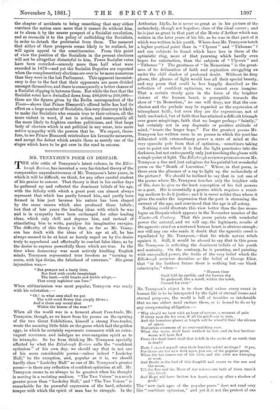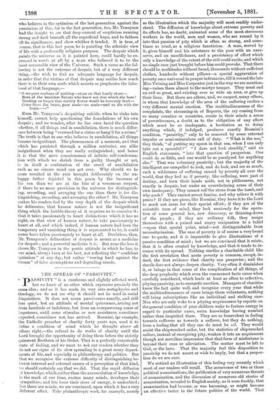• MR. TENNYSON'S POEM ON DESPAIR.
THE able critic of Tennyson's latest volume, in the Edin- burgh Review, has invented a very far-fetched theory of the comparative unproductiveness of Mr. Tennyson's later years, in which it will be difficult, we think, for any other careful student of his genius to concur. That theory is that in his earlier days he gathered up and reflected the dominant beliefs of his age, with the felicity with which a great poet can almost always represent that which has partly formed him, and partly been
formed in him just because his nature has been shaped by the same causes which also produced those beliefs ; but that of late years the leading ideas with which he was and is in sympathy have been exchanged for other leading ideas, which only chill and depress him, and instead of stimulating him to write, paralyse his imaginative energies. The difficulty of this theory is that, so far as Mr. Tenny- son has dealt with the ideas of his age at all, he has always seemed to be at least as keenly urged on by the desire truly to apprehend and effectually to combat false ideas, as by the desire to express powerfully those which are true. In the time when democracy was most actively kindling English minds, Tennyson represented true freedom as "turning to scorn, with lips divine, the falsehood of extremes." His great injunction was,—
" But pamper not a hasty time,
Nor feed with crude imaginings
The herd,—wild hearts and feeble wings,—
That every sophister can lime."
When utilitarianism was most popular, Tennyson was ready with his refutation :— " Oh ! to what uses shall we put
The wild-weed flower that simply blows ;
And is there any moral shut Within the bosom of the rose P" When all the world was in a ferment about Free-trade, Mr. Tennyson, though, as we know from his poems on the opening of the two Great Exhibitions, himself a strong Free-trader, wrote the amusing little fable on the goose which laid the golden eggs, in which he certainly represents commerce with no extra- vagant reverence, and indulges no over-sanguine spirit as to its triumphs. So far from think:ng Mr. Tennyson specially affected by what the Edinbuvgh Review calls the "confident optimism" of his own day, we should say that in not one of his more considerable poems—unless indeed " Locksley Hall," be the exception, and, popular as it is, we should hardly class " Locksley Hall" as one of Mr. Tennyson's greater poems—is there any reflection of confident optimism at all. Mr. Tennyson seems to us always to be greatest when his thought is moving in a resisting medium. "The Two Voices" is a much greater poem than " Locksley Hall," and "The Two Voices" is remarkable for its powerful expression of the hard, atheistic temper with which the spirit of man has to struggle. In the Arthurian Idylls, he is never so great as in his picture of the melancholy, though not hopeless, close of the ideal career ; and he is just as great in that part of the Morte d'Arthur which was written in the later years of his life, as he was in that part of it which was written in his youth. Where does Mr. Tennyson touch a higher poetical point than in " Ulysses " and " Tithonus " and can subjects be found which have less in them of the optimistic ring, more of that yearning which hardly even hopes for satisfaction, than the subjects of " Ulysses " and " Tithonus " ? The greatness of "In Memoriam" is the great- ness of its delineation of faith and aspiration struggling on under the chill shadow of profound doubt. Without its deep gloom, the gleams of light would lose all their special beauty, and any poem that could be less happily described as the reflection of confident optimism, we cannot even imagine. That a certain steady gain in the force of the brighter visions of the human heart, is perceptible towards the close of "In Memoriam," no one will deny, nor that the con- clusion and the prelude may be regarded as the expression of triumphant faith ; but even they are the expressions, not of faith unclouded, but of faith that has attained a difficult triumph over grave misgivings, faith that no longer perhaps "faintly," but certainly not in any dogmatic or positive attitude of mind, "trusts the larger hope." Far the greatest poems Mr. Tennyson has written seem to us poems in which the poet has delineated with extraordinary power a state of mind at the very opposite pole from that of optimism,—sometimes taking care to point out where it is that the light penetrates into the darkness, but not unfrequently only just touching the gloom with a single point of light. The Edinburgh reviewer pronounces on Mr. Tennyson a fine and just eulogium for his painful but wonderful poem on the "Death of Lucretius." Where, in that poem, is there even the glimmer of a ray to light up the melancholy of the picture ? We should be inclined to say that in not one of the poems where Mr. Tennyson touches only the brighter side of life, does he give us the least conception of his full powers as a poet. His is essentially a genius which requires a resist- ing medium to do it justice ; and it is never nobler than where it gives the reader the impression that the poet is stemming the current of the age, and convinced that the age is all astray.
Nothing could illustrate this view better than the fine mono- logue on Despair which appears in the November number of the Nineteenth Century. That this poem paints with wonderful power the natural, and we will say, the legitimate, results of the agnostic creed on a tortured human heart, is obvious enough ; nor will any one who reads it doubt that the agnostic creed is repudiated by Mr. Tennyson,—that his whole nature rebels against it. Still, it would be absurd to say that in this poem Mr. Tennyson is reflecting the dominant beliefs of his youth and maturity. On the contrary, he is painting, and painting with unequalled power, the fruits of the very belief which the Edinburgh reviewer describes as the belief of George Eliot, that "in the furthest future there is nothing but one blank
catastrophe," when-
" Human time Shall fold its eyelids, and the human sky Be gathered, like a scroll, within the tomb, Unread for ever."
Mr. Tennyson's object is to show that unless every event in human life is to be interpreted by the light of eternal issues and eternal purposes, the world is full of troubles so intolerable that no one either need endure them, or is bound to do so by any overpowering obligation :—
"Why should we bear with an hour of torture, a moment of pain If every man die for ever, if all his griefs are in vain,
And the homeless planet at length will be wheel'd thro' the silence of space, Motherless evermore of an ever-vanishing race,
When the worm shall have writhed it lust, and its last brother.
worm will have fled- From the dead fossil skull that is left in the rocks of an earth that
is dead ?
Have I crazed myself over their horrible infidel writings ? 0 yes, For these are the new dark ages, you nee, of the popular press, When the bat comes out of his cave, and the owls are whooping
at noon,
And Doubt is the lord of this dunghill and crows to the sun and the moon, Till the Sun and the Moon of oar science are both of them torn'd into blood, And Hope will have broken her heart, running after a shadow of good..,
The "new dark ages of the popular press" does not read very like "confident optimism," and yet it is not the protest of one who believes in the optimism of the last generation against the pessimism of this, for in the last generation, too, Mr. Tennyson had the insight to see that deep current of scepticism running strong and dark beneath all the superficial hope, and to fathom all its significance, and show whither it tended. It is true, of course, that in this last poem he is painting the atheistic view of life with a profoundly religious purpose. The despair which paints the universe as it is painted here, could hardly be ex- pressed in words at all by a m an who believed it to be the most reasonable view of the 'Universe. Such a verse as the fol- lowing is not the outcome of despair, but of a very different thing,—the wish to find an adequate language for despair, in order that the victims of that despair may realise how much there is in their own souls which asserts or prophecies the false- hood of that language,—
" 0 we poor orphans of nothing—alone on that lonely shore— Born of the brainless Nature who knew not that which she bore ! Trusting no longer that earthly flower would be heavenly fruit— Come from the brute, poor souls—no souls—and to die with the
brute—" Even Mr. Tennyson's despairing suicide, when he sinks into himself, cannot help questioning the foundations of his own despair ; and no wonder, after he has once faced the question whether, if all things end in annihilation, there is much differ- ence between being "crowned for a virtue or hang'd for a crime." The truth is that to one who believes in annihilation, all things become insignificant. The phenomenon of a moment, and that which has persisted through a million centuries, are alike insignificant when they are really extinguished ; and hence it is that the mere consciousness of infinite self-condemna- tion with which we shrink from a guilty thought or act, is in itself a confutation of the creed of annihilation such as no sincere mind can get over. Why should we be more revolted at the ruin brought deliberately ou the un- happy father depicted in this poem by the baseness of his son than we are at the bite of a venomous serpent, if there be no more provision in the universe for distinguish- ing, recording, and avenging the one than there is for dis- tinguishing, recording, and avenging the other ? Mr. Tennyson makes his readers feel by the very depth of the despair which he delineates, that human nature is not the insignificant thing which the bubble-theory of it requires us to conceive it ; that it takes passionately to heart distinctions which it has no
right, on that view of human nature, to take passionately to heart at all, and which indeed, if human nature had been the
temporary and vanishing thing it is represented to be, it could never have taken passionately to heart at all. Doubtless, then, Mr. Tennyson's delineation of despair is meant as a medicine for despair ; and a powerful medicine it is. But none the less it shows Mr. Tennyson in the poetic attitude in which he has, to our mind, always been at his best, not reflecting the "confident optimism" of any day, but rather "rowing hard against the stream" of false assumptions and degrading creeds.



































 Previous page
Previous page